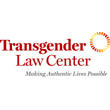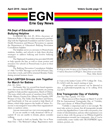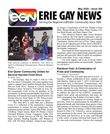Groundbreaking Research Provides Insight into Lives of Transgender People Living with HIV/AIDS
Report and videos by transgender women living with HIV to be featured at launch event in Atlanta, GA: 6pm at Center for Civil and Human Rights
Atlanta, GA - March 24, 2016 – Today, Transgender Law Center released the first report of findings from the Positively Trans survey, a first-of-its-kind community-led project focused on the lives and experiences of transgender people in the U.S. living with HIV/AIDS.
"Positively Trans sets out to demonstrate that transgender people living with HIV are capable of developing research and program priorities and to lead national conversations and advocacy efforts that aim to end an epidemic that disproportionately impacts us," said Cecilia Chung, Senior Strategist at Transgender Law Center and lead staff for the organization's Positively Trans project. "Through our research, we are making it clear that transgender people, and particularly transgender women of color, face unique challenges in living with HIV, and we must be at the table when policy and funding decisions are made."
Some of the starkest findings outlined in the report concern income, education, and history of incarceration. While 64 percent of respondents had at least some college experience, a full 43 percent earn less than $12,000 a year. Additionally, 41 percent had some history of incarceration, and of those who had experienced incarceration, more than one in two had gone at least 6 months without medical care since their diagnosis.
In addition to providing a richer picture of the realities of life for transgender people living with HIV, the research indicated paths for action. When responding to questions about priorities and health concerns, HIV-related discrimination topped the list of legal priorities for transgender people living with HIV, with discrimination around employment, public accommodations, identity documents, and housing close behind. Top three health concerns were gender-affirming and non-discriminatory care, hormone therapy and side effects, and mental health care.
Based on these findings and the work of the nine-member Positively Trans advisory board, the report offers five recommendations for programs and initiatives to protect transgender health and access to legal rights. These recommendations include rights-based trainings by and for transgender people living with HIV, the development of support systems, and the implementation of economic initiatives to relieve barriers to care.
As a companion to the research and as a leadership development strategy, Transgender Law Center has begun offering digital storytelling workshops to transgender people who are most impacted by or living with HIV. The first round of videos, produced in a workshop with Black transgender women from the South, premiere this evening at a launch event in Atlanta, Georgia.
The research was conducted using both English and Spanish survey instruments, with 20 percent of surveys completed using the Spanish language instrument. More than 400 people attempted the survey, and the final analytical sample includes data from 157 complete responses. Responses came from 35 states and Puerto Rico, with a majority of responses coming from transgender people of color, and primarily transgender women of color.
Transgender Law Center launched Positively Trans in 2015 with the support of the Elton John AIDS Foundation as a response to the structural inequalities that drive the high rate of HIV/AIDS and poor health outcomes. By partnering with a National Advisory Board of community leaders, Positively Trans seeks to mobilize and promote resilience of transgender people most impacted by or living with HIV/AIDS, particularly transgender women of color, through research, policy advocacy, legal advocacy, and leadership strengthening.
The full report, videos by transgender women living with HIV, and more information about Positively Trans is available at: http://transgenderlawcenter.org/programs/positively-trans.
Transgender Law Center changes law, policy, and attitudes so that all people can live safely, authentically, and free from discrimination regardless of their gender identity or expression.



